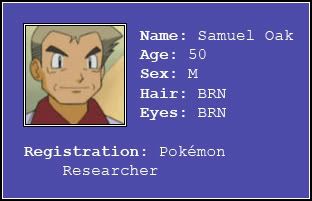PokéDex
From Dexnet
Contents |
Pokémon Trainer's License
It is absolutely illegal to own Pokémon without a Pokémon Trainer's License. Even when merely keeping a single Pokémon as a housepet, the person responsible for it must have a license to keep it legally. One also must have a license to legally purchase PokéBalls.
Fortunately, it's relatively easy to obtain a Pokémon License in any given city. Licenses are issued by PokéCenters. Applicants must sit in for a half-day class, and then pass a brief exam. Once the applicant has been approved, they're issued a Pokémon Trainer's License and a PokéDex.
The minimum age to own a Pokémon License is 10. School-age Pokémon trainers are also exempt from school as long as they have a valid license. Licenses must be renewed every four years, but this is as easy as going to a PokéCenter and getting a new one printed out. It is also possible to have a Pokémon license revoked, but this only happens in cases of felony conviction.
The information on a Trainer's License consists of their name, age, sex, hair and eye colours, and their official reason for registration printed on the front of the card, and on the back of the card is their license number and home address, along with the issue date of their original license and the expiration date of their current license.
The following options are on the license application under registration: Pokémon Trainer Pokémon Researcher Pokémon Breeder Pet Owner Gym Member Other (please specify)
If the specified "Other" falls within one of the other five categories, it will be listed as one of those categories instead of what was specified.
The PokéDex
The PokéDex is registered to the user under the same name as their license, and it doubles as an electronic license. The card can be flashed as quick proof, but the PokéDex Profile is just as good, if not better. The PokéDex can also be connected to a normal computer to transfer information or files, and they can also be used by PokéCenters or Police to verify personal information through the database. Because of its convenience, many trainers opt to just leave the plastic license at home and carry only the PokéDex as proof of their status.
By default, the PokéDex has general information on all the Pokémon breeds in the region it was issued in. (Kanto's have information on all the Kanto Pokémon, Johto's have information on all the Pokémon found in Johto, etc.) Information on Pokémon from other regions can be downloaded at any PokéCenter, either for an individual Pokémon or as a package for the whole region.
In addition to the general information on Pokémon breeds, the PokéDex keeps a record of all the Pokémon its registered trainer has caught, which ones they've kept, and which ones they carry in their current team. It also has much more detailed information for Pokémon that the trainer has owned, as well as registering each caught Pokémon with a unique ID number and OT -- the original trainer who caught or bred it. Trainers can also set them to record data from individual Pokémon matches, data about people and places, or other miscellaneous information that the user wishes to keep record of. Professor Oak, the inventor of the PokéDex, has his license profile as the last entry on every PokéDex. The trainer's profile will be the first entry.
Externally, the PokéDex is highly customizable. They are initially issued in a plain, flat red and flip open to reveal a mini-keyboard. PokéMarts carry customized casing of all price-ranges, and the original red casing can be switched out for a different look at the trainer's leisure. Those who don't quite trust themselves with a screwdriver can have the PokéMart replace the casing for a fee.
DexNet
Recently, an intranet system has been developed for the PokéDex. It is automatically implemented on all PokéDexes, though whether or not the trainer makes use of it is their choice. The intranet allows trainers to communicate with other trainers through the PokéDex, as a sort of BBS. It's based on wireless towers, and currently these towers only carry signal throughout Kanto and Johto. It is possible to access the intranet by hooking a PokéDex up to a regular internet connection, so communication from Sinnoh and Hoenn would be possible if a trainer from Kanto or Johto were to travel there. However, the system is not implemented on Sinnoh's or Hoenn's PokéDex networks, so only trainers with a Kanto or Johto PokéDex can access this intranet.
This intranet is called the DexNet. By default, the photo used for a trainer's profile (their license photo) is the one that will accompany their posts on the DexNet. However, trainers can manually set specific photos to accompany certain posts, or turn on the PokéDex's minicam to post with their appearance at the time. All posts by a trainer are also marked with the trainer's registered name. It is also possible to look up trainer profiles over DexNet if you know the trainer's name.
Trainer Profiles
Trainer Profiles, aka license information, looks something like this:

It's a digital representation of the trainer's plastic license, with the exception of the detailed license number and address information on the back of the card. That information is stored digitally inside the PokéDex and is not visible on a trainer's profile.
